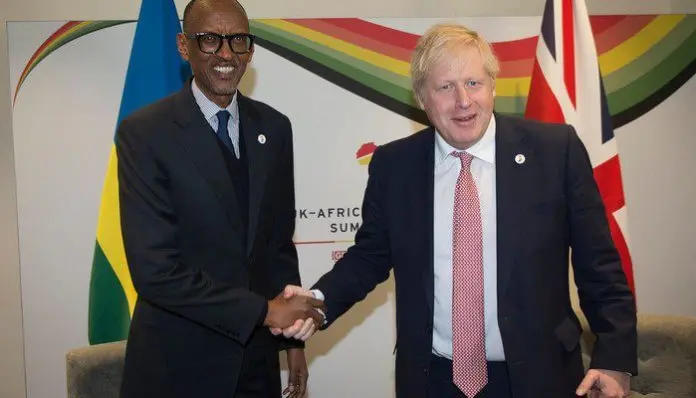- P.O. Box: 11482 Yaoundé, Cameroon; Headquarters: Efoulan, Yaoundé 3
- contact@caessinternational.org

On April 14, 2022, Great Britain signed a controversial agreement with Rwanda for the repatriation of illegal migrants to Rwandan territory. These migrants, mostly asylum seekers, are now to be hosted in Rwanda, from where their asylum claims will be processed. In the event of a favorable outcome, the claimants cannot return to the UK but must remain in Rwanda, located more than 6,000 kilometers from London. This agreement has been met with disapproval from civil society organizations protecting migrant rights. For the British government, the agreement primarily targets migrant smugglers to discourage their activities, which, according to British Prime Minister Boris Johnson, "cause too much human misery and death," as seen in the drowning of twenty-seven (27) people in the English Channel in November 2021.
In a strategy aiming to outsource asylum seekers to Rwanda, the British defend their agreement with Kigali as "creative" and "compassionate," according to UK Home Secretary Priti Patel during her visit to finalize the partnership terms in Rwanda. She further described Rwanda as a safe country that respects the rule of law and human rights. On their side, Rwandan authorities, through Foreign Minister Vincent Biruta, expressed feeling privileged by this opportunity offered by Great Britain. Indeed, the latter will fund the provision of housing and training for asylum seekers, with an initial payment of 120 million pounds sterling. This is a form of deportation that does not concern minors and does not aim to separate children from their parents. In return, Rwanda reserves the right to reject asylum seekers with a criminal record.
While Boris Johnson’s migration policy causes suffering, chaos, and huge expenses—estimated at 1.4 billion pounds per year by the Refugee Council’s director, Enver Solomon—it is even more troubling according to Yvette Cooper, who calls it immoral, costly, and impossible to implement. For the current British government, this represents fulfilling a key post-Brexit promise to "take back control" of the borders, in a context marked by an increase in migrants crossing the English Channel successfully in 2021.
No longer able to use the Dublin Regulation to send back migrants who have already applied for asylum in the European Union, Great Britain has chosen the Rwandan partnership. Although not yet passed in Westminster, the Nationality and Borders Bill authorizing transfers of asylum seekers “fundamentally contradicts the government’s commitments to uphold its obligations under the [Geneva] Refugee Convention,” according to the United Nations High Commissioner for Refugees (UNHCR). Hence the strong opposition of the UNHCR regarding Rwanda’s designation as a safe country for asylum seekers. The NGO Human Rights Watch goes further by highlighting arbitrary detentions, mistreatment, and torture in unofficial detention centers, which appear to be common practices in Rwanda.
Nevertheless, this agreement is seen as a geopolitical coup and an economic opportunity for Rwanda. Geopolitically, Rwanda is presented as a safe country that respects the rule of law. Economically, it benefits from funding amounting to 145 million euros for implementing the agreement and for the country’s development, especially in the fight against poverty, with nearly 40% of the population still living below the poverty line. This agreement with Great Britain comes at a time when Rwanda already hosts over 130,000 refugees, primarily from the Democratic Republic of Congo and Burundi, yet Kigali remains ready to accommodate several thousand, or even tens of thousands, of migrants returned from the UK. However, part of the Rwandan opposition raises alarms, citing the country’s high population density and insufficient land, which could lead to future land access conflicts.
Moreover, Rwanda is not new to this type of partnership. Examples include:
The aborted project with Israel, which planned to expel African asylum seekers to Rwanda and Uganda;
Since 2019, Rwanda has hosted a UN High Commissioner program that evacuates migrants detained in Libya;
More recently, the country received Afghan refugees who fled after the Taliban takeover, notably the entire student body and staff of a girls’ boarding school.
Similar projects are currently being developed with countries like Denmark and Belgium.